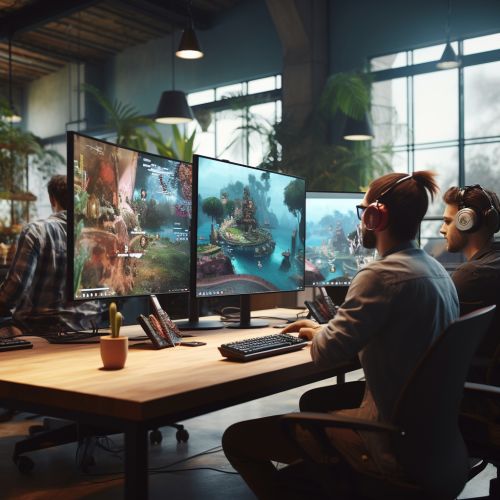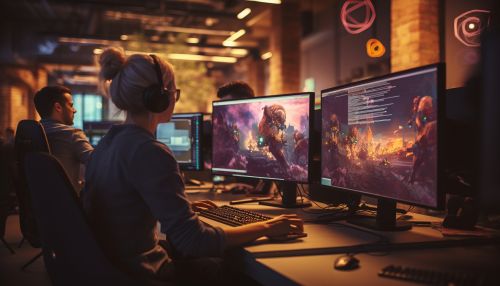Video Game Development
Overview
Video game development is the process of creating a video game. The effort is undertaken by a developer, who may range from a single person to an international team dispersed across the globe. Traditional commercial PC and console games are normally funded by a publisher and take several years to reach completion. Indie games usually take less time and can be produced cheaply by individuals and small developers. The independent game industry has seen a substantial rise in recent years with the growth of new online distribution systems and the mobile game market.


Development Process
The development process of a video game is complex and can be broken down into several stages: concept, pre-production, production, and post-production.
Concept
The concept phase is the initial stage where the idea for the game is created. This includes the game's genre, core gameplay mechanics, setting, plot, and characters. The concept is often presented in a game design document, a comprehensive blueprint of the game.
Pre-production
Pre-production is the planning stage, where the main gameplay mechanics are fleshed out, the story is finalized, and concept art is created. The game engine may be developed from scratch or, more commonly, licensed from a third-party.
Production
During the production phase, the game is actually created. This includes programming, asset creation, and level design. This is the most time-consuming and resource-intensive stage of development.
Post-production
Post-production involves testing the game for bugs, balancing gameplay, and adding final touches. Once the game is deemed complete, it is shipped to consumers. After release, the game may receive updates or downloadable content to enhance or extend the player's experience.
Roles in Development
There are several roles involved in the development of a video game, including game designers, programmers, artists, and testers.
Game Designers
Game designers are responsible for designing the gameplay mechanics, story, characters, and setting of the game. They often work closely with the rest of the development team to ensure that the game is fun and engaging.
Programmers
Programmers write the code that makes the game function. They work with the game designers to implement the gameplay mechanics and with the artists to implement the visual assets.
Artists
Artists create the visual assets of the game, including characters, environments, and user interface elements. They work closely with the game designers to ensure that the visuals match the game's concept and setting.
Testers
Testers play the game repeatedly to find and report bugs. They also provide feedback on gameplay and balance.
Game Engines
A game engine is a software framework used to create and develop video games. Developers use them to create games for consoles, mobile devices, and personal computers. The core functionality typically provided by a game engine includes a rendering engine for 2D or 3D graphics, a physics engine or collision detection, sound, scripting, animation, artificial intelligence, networking, streaming, memory management, threading, and a scene graph.
Independent Game Development
Independent game development, or indie game development, is the creation of video games by individuals or small teams without the financial support of a large game publisher. Indie games often focus on innovation and rely on digital distribution.
